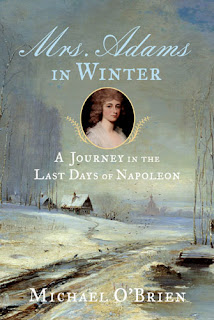By Paul Carrier
The "Mrs. Adams" of Michael O'Brien's engrossing look at a little-known event from the early 19th century is Louisa Catherine Adams, the wife of diplomat and future President John Quincy Adams and the daughter-in-law of former President John Adams.
British-born and partially raised in France, Louisa Adams was overshadowed by the family into which she married, which included her famous mother-in-law, Abigail Adams. But as Michael O’Brien makes clear in Mrs. Adams in Winter, Louisa Adams was a noteworthy person in her own right who, in the winter of 1815, did a remarkable thing.
Accompanied by her young son, Charles Francis, Adams boarded a private carriage in St. Petersburg, Russia, and began a 40-day, 2,000-mile journey to Paris, to join her husband there. In the process, she passed from the Russian Empire into Prussia, dipped into the Duchy of Warsaw, reentered Prussia and rode through what was then known as the Confederation of the Rhine before finally entering France.
Her small retinue included a French prisoner of war who was to serve as a protector of sorts, in exchange for passage to his own country. The adventures they had along the way were alternately frustrating, harrowing and eye-opening, particularly when you consider that such a trip was a relatively unusual undertaking for a woman of that era, traveling through a Europe freshly scarred by war.
Mrs. Adams in Winter branches off into myriad figurative alleys and byways as Adams makes her way toward Paris. O’Brien uses Adams’ route, and her stops along the way, as launching pads from which to examine the people and places that dot her itinerary. In the process, we learn much about Adams as well, for the book recounts both her trip to Paris and the journey of her life, to that point in time.
Initially, I found some of these asides irritating; they seemed to digress from the book’s stated topic. But as I worked my way through this fascinating slice of history, it became clear that what first seemed like frustrating detours actually provided useful context, making for a more captivating read.
Still, if you’re hoping for a straightforward “if it’s Tuesday this must be Riga” narrative of Adams’ journey, you may be taken aback by the wide angle of O’Brien’s lens. At one point, for example, while Adams nears the French border, O’Brien pulls us away from her journey with a more than 50-page dissertation on her strained marriage. Yet this is the most moving section of the book.
As O'Brien explained in an interview with Library Journal, Adams was "warm, affectionate, spontaneous, gossipy and deeply insecure," while her husband was "cold, reserved, deliberate" and self-assured. Even her husband's hometown, Quincy, Mass., which Adams first visited in 1801, left her feeling lost and adrift.
"Church services were different," O'Brien writes, "they sang oddly, they took dinner at a funny time, they had strange manners, the old men were weird."
O’Brien details the logistics and the difficulties of traveling in Europe, in winter, at a time when evidence of the Napoleonic wars was everywhere. At one point, for example, the carriage passes a field littered with human bones, the site of a battle that occurred as Napoleon's army retreated from its failed invasion of Russia in 1812.
While much of the journey entailed only minor problems, there were frightening episodes as well. Once in France, for example, Adams had a hair-raising encounter with members of Napoleon's reconstituted Imperial Guard as they marched to Paris to rejoin their emperor following his escape from Elba and his return to France.
Soldiers stopped Adams' carriage at gunpoint while camp followers, recognizing the carriage as Russian and assuming that its occupants were as well, demanded that they be killed. One of Napoleon's generals, Claude Etienne Michel, came to the rescue of the woman who would later become the only foreign-born first lady in American history. Three months later, Michel was killed at Waterloo.

